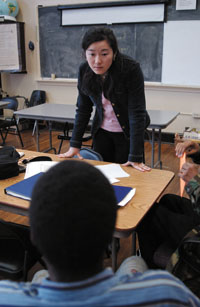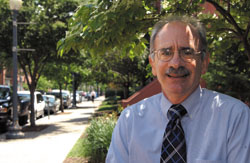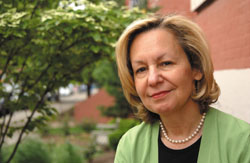An Urban Education
A new program targets the training needs of D.C.-area
teachers.
By Jamie L. Freedman

|

GW Graduate School of Education and Human Development student Maiko Callister
works with students at Cardozo High School in the District.
Julie Woodford
|
The statistics are shocking. Seventy five percent of
urban public school teachers call it quits within five
years of launching their careers. Standardized test scores
in urban school districts lag far behind those in suburban
areas, as high numbers of students struggle to achieve
literacy.
GW’s Graduate School of Education and Human Development’s
Department of Teacher Preparation and Special Education
is fighting to reverse these troubling trends in District
of Columbia Public Schools. Armed with a five-year, multimillion
dollar Teacher Quality Education Partnership grant from
the U.S. Department of Education, GSEHD recently created “The
Literacy Collaborative: Communities of Practice,” a
consortium of public and private organizations dedicated
to developing new and innovative strategies to recruit,
train, support, and retain quality teachers for D.C.
public schools. Nearly $10.5 million has been pledged
by the Department of Education (46.8 percent) and consortium
members (53.2 percent) to fund new and continuing teacher
preparation and retention initiatives aimed at improving
literacy rates among District schoolchildren.
“High attrition rates for teachers, high absentee
rates for students, and low achievement are part and
parcel of urban school systems,” says Jay R. Shotel,
chair of GW’s Department of Teacher Preparation
and Special Education and co-principal investigator of
the project, along with GSEHD Director of Special Projects
and Professor of Special Education Maxine Freund. “We
believe we can make a difference. We’ve already
made a significant difference at D.C.’s Cardozo
High School, where we’ve trained 50 secondary and
special education teachers through the Urban Initiative
preservice program. Now, we’re eager to impact
the entire system by training a cadre of committed teaching
professionals specializing in literacy. It’s very
exciting.”
Recruitment efforts are now underway for the program’s
summer 2005 inaugural class of 21 teacher candidates,
who will serve as full-time interns in seven elementary
and middle schools in Southeast Washington and participate
in a yearlong seminar focusing on literacy, issues of
urban education, and the application of technology to
urban schools. Rigorous coursework and special projects
will round out the program, culminating in initial licensure
and a master’s degree in the area of elementary
education, special education, or secondary education
(English). Candidates may also opt to pursue dual degree
credentials, combining certification in elementary or
secondary education with licensure in special education.
Participants will receive significant scholarship support,
as well as a $500 tax-free monthly stipend.
“The Teacher Quality Education Partnership, which
created the Literacy Collaborative, is an excellent enhancement
for the type of change I am pushing within DCPS,” says
D.C. Public Schools Superintendent Clifford B. Janey. “We
are working harder and smarter to recruit and retain
highly qualified teachers for DCPS schools. This joint
effort on the part of the collaborative comes at a time
when we are introducing new and more rigorous academic
standards for students, which brings with it new expectations
for teachers. I look forward to the work of the collaborative
helping us as we take achievement in DCPS to the next
level.”

Julie Woodford
“An exciting part of the project will
be helping the District develop support systems
in the new teacher induction process, as well as
the mentoring process, and building a set of structures
that makes teachers feel that they’re appreciated
and accomplishing something so that they want to
stay.” —Jay
R. Shotel, Chair, GW Department of Teacher Preparation
and Special Education
|

|
The grant will also provide advanced training for veteran
D.C. public school teachers and administrators seeking
to expand their critical literacy and instructional leadership
skills. “We’ll provide professional development
support for 40 existing D.C. teachers to become literary
leaders and coaches in their schools over the five years
of the partnership,” Shotel says. Through their
efforts, combined with those of the 105 skilled, new
teachers who emerge from the program, GW hopes to implement
lasting change in the system.
“We see this as a tremendous opportunity to strengthen
GW’s nationally recognized teacher education programs
while ensuring additional high quality teacher candidates
for the District of Columbia Public Schools,” says
Shotel, who notes that the team already has received
150 inquiries for the program’s first 21 slots. “GW
has a long tradition of recruiting talented arts and
sciences majors and mid-career professionals to work
in urban schools. Through this partnership, we will implement
changes in teacher training, induction, and mentoring
that we hope will become a model for the whole system.”
Janey says the grant’s dual emphasis on recruiting
and training skilled teachers and supporting veteran
teachers through professional development is the perfect
recipe for success. “My experience and research
indicate that the retention and continuous development
of highly qualified teachers remains at the center of
successful and sustainable school-based reform,” he
says.
Consortium partners include GW’s Columbian School
of Arts and Sciences, The State Education Agency of the
District of Columbia, Community Preservation & Development
Corp., National Institute for Urban Schools Improvement,
Center for Health & Health Care in Schools, Aequus
Technologies, The New Teacher Center, and In2Books. United
by an interest in teacher quality, urban education, and
curriculum development, advisory board members are active
participants in the project, sharing their expertise
to make substantial direct and indirect contributions
to the Literacy Collaborative. “We are developing
a community of practice, where experts from a number
of fields connected to one another by a common sense
of purpose come at the problem from different perspectives,” Shotel
says.
The project builds on GW’s excellent track record
of training skilled educators who remain in urban school
systems. “Nationwide, the beginning teacher attrition
rate in urban schools is approximately 75 percent over
the first five years, compared to only 11 percent among
GW graduates,” Shotel says. “Our attrition
rate is low because GW-trained teachers are prepared
well for what they will face in their jobs.”

|

Julie Woodford
“First and foremost, our emphasis is on
preparing our pre-service teachers to meet the
challenges of supporting their students in acquiring
literacy. By training 145 new and continuing teachers
to model the best practices for improving literacy
rates in their classrooms, we’re hoping to
create a new generation of teachers for D.C. Public
Schools.” —Maxine
Freund, Director of Special Projects and Professor
of Special Education
|
According to Shotel, a vital key to teacher retention
is the provision of strong support systems. “An
exciting part of the project will be helping the District
develop support systems in the new teacher induction
process, as well as the mentoring process, and building
a set of structures that make teachers feel that they’re
appreciated and accomplishing something so that they
want to stay.”
The grant’s focus on literacy is paramount, according
to Freund. “First and foremost, our emphasis is
on preparing our pre-service teachers to meet the challenges
of supporting their students in acquiring literacy,” she
says. Freund defines literacy in broad-based terms, encompassing
the skill sets to be competent readers, writers, and
users of technology and applying those skills across
the disciplines. “By training 145 new and continuing
teachers to model the best practices for improving literacy
rates in their classrooms, we’re hoping to create
a new generation of teachers for D.C. Public Schools.”
Freund is helping to blaze another vitally important
trail in the education world through her work with the
National Board for Professional Teaching Standards. She
is currently completing a two-and-a-half year National
Board-sponsored research study examining the importance
of mentoring and support groups to teachers’ success
in navigating the rigorous board certification process.
“We were given a sample of candidates seeking
National Board certification across the country and examined
the relationship between who was mentored and supported
through the process and who achieved candidacy,” she
says, noting that nearly 900 teachers participated in
the study. Freund submitted her report to the National
Board in April and presented her findings at the April
meeting of the American Educational Research Association
in Montreal. She also presented her work at the National
Board meeting in Washington in July.
Another large-scale research initiative currently underway
at the Graduate School of Education and Human Development
seeks to measure the success of highly rated middle school
science curriculum units with diverse student populations.
A collaborative effort between GW’s school of education,
the Department of Anthropology, and Montgomery County
(Maryland) Public Schools, the five-year project is funded
by a $5.2 million Interagency Education Research Initiative
grant, administered through the National Science Foundation.
GW research team members include Professor of Teacher
Preparation and Special Education Sharon Lynch, Professor
of Anthropology Joel Kuipers, and Associate Professor
of Secondary Education Curtis Pyke.
“I’ve been interested in science education
reform and equity issues for at least 10 years now,” Lynch
says. “Despite the best intentions to increase
equity and to close achievement gaps, the science education
reform movement has failed to adequately respond to the
diversity of the U.S. student population. We designed
this research study to identify the conditions under
which three carefully designed, high quality science
curriculum units, aligned with reform goals, improve
student learning of challenging science concepts on a
large scale.”
Montgomery County Public Schools is a large, top-performing
Maryland school district that is extremely diverse—culturally,
linguistically, and socioeconomically. Composed of nearly
140,000 students from 163 different countries, MCPS has
no ethnic majority. The research project, known as SCALE-UP,
is implemented in two phases. During phase one, a student-centered,
hands-on science unit is introduced to eighth graders
in five middle MCPS middle schools, while students in
five demographically matched comparison schools receive
instruction guided by a menu of other approved curricular
choices. In the scale-up phase of the study, the unit
is progressively introduced at 15 more middle schools,
followed by all 37 MCPS middle schools the following
year. The project also includes an ethnographic component,
with anthropologist Kuipers videotaping students to better
understand their level of involvement and experiences
as they move through the units. Upon the study’s
completion in 2007, more than 200,000 students and 250
teachers will have participated.
Initial results are positive, reports Lynch. “Students
exposed to the first new unit scored significantly higher
on their assessment than those in the comparison group,” she
states. “Most importantly, disaggregated data indicate
that the intervention is improving outcomes for all demographic
subgroups. That hardly ever happens in education, and
by the time the grant is completed, we should have a
much better idea about how this is occurring. Everyone
wins, which is great news.”
|